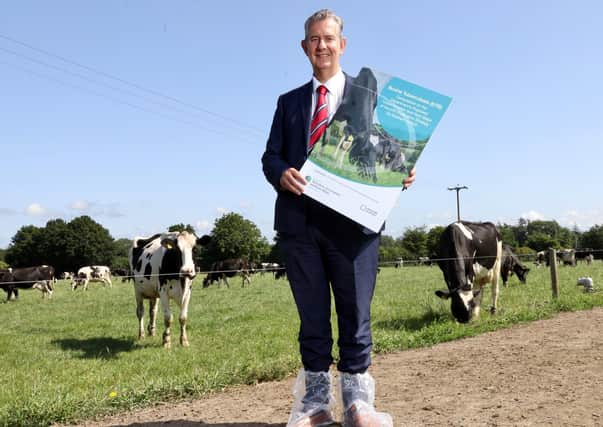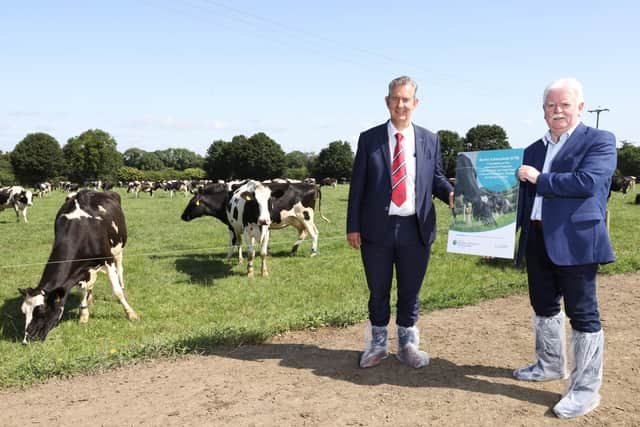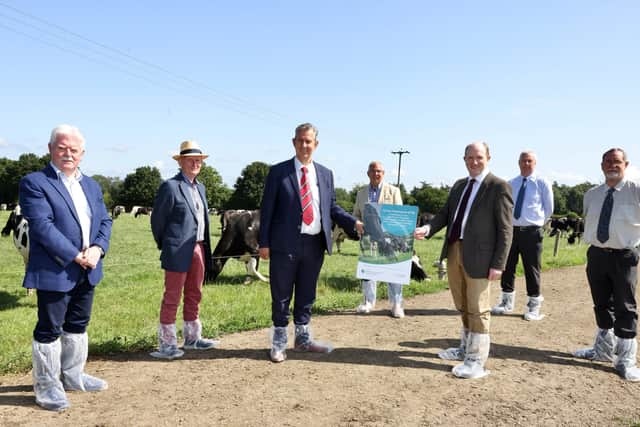Poots outlines proposals to eradicate Bovine TB in Northern Ireland


Launching a consultation document at CAFRE’s Greenmount campus on the Department’s proposed implementation and next steps of a bTB Eradication Strategy for NI, Minister Poots said: “I recognise the challenges that face all of us due to the current high TB incidence. It is the source of significant stress for our farming families and has the potential to inflict serious damage on the wider agri-food industry and its ability to trade on a global scale.
“The proposals outlined in the consultation document are based on the experience and evidence from other jurisdictions; and on solid scientific research. I want to hear the views of all our stakeholders. I will then consider the responses and weigh those up against the evidence and information available, only then will I make a final decision on the way forward.”
Advertisement
Advertisement
The minister continued: “To eradicate TB, all factors which contribute to the spread and maintenance of the disease in the environment must be addressed through a holistic approach. I know that wildlife, and badgers in particular, are a significant factor in the maintenance of bTB in cattle.


“In the consultation document, therefore, I am proposing a wildlife intervention strategy to address this. It is essential that the overall bTB infection load in badgers is reduced, but once this has been achieved it is my intention to move as quickly as possible to a vaccination-only approach. There is an urgent need to take action to ensure we realise the potential of both a healthy cattle and wildlife population in Northern Ireland ”
According to the minister, the annual cost of the TB programme is around £36-£40million, almost half of which is paid in compensation for infected cattle.
He continued: “This is simply not sustainable. We cannot continue to use the same strategy yielding poor results for the taxpayer, industry and animal disease. Therefore, I am also proposing changes to the level and rates on which compensation is paid and will seek views on this.
Advertisement
Advertisement
“I wish to introduce further enhancements to the existing TB Programme such as the testing of non-bovines and the criteria on which interferon gamma testing would be made compulsory. This will build on the current programme and support industry to work closely with us, playing an active part in getting rid of this disease.


“While DAERA has already taken a number of measures to address the issue, I want to keep us all focused on moving forward together towards reducing TB levels in the short term and in the longer term eradicating this disease from the Northern Ireland herd.
“Importantly, this strategy and the actions contained within it, will be subject to regular review and assessment, and will adapt to ensure that we ultimately reach a position where limited intervention by government is needed and eradication becomes a reality for Northern Ireland.”
The Pedigree Cattle Trust has welcomed the publication of the Bovine Tuberculosis Consultation Document.
Advertisement
Advertisement
A spokesperson said:“It has taken many years to produce this Document. Some of the recommendations are to be welcomed. However, lessons learnt from the present human pandemic have not even been discussed. The technology behind the thinking in this document is limited because it is in many cases outdated.
“The Pedigree Cattle Trust welcomes, at last, the assertion and conclusion that badgers have an important role in the disease picture. We also welcome the assurance that the top priority of the Minister is to reduce and eradicate bTB.
“However, this priority is in itself flawed. Surely the priority should be to eradicate bTB. In the short term this will be impossible but that should be the aim.”
Commenting specifically on the proposed £5,000 future compensation cap, the spokesperson from the Pedigree Cattle Trust said: “These proposals are extremely difficult to accept, particularly when there is no end in sight to the present crisis. In particular, there is no detailed scientific evidence quoted in the consultation document, which will have a guaranteed reduction in the incidence of the disease.
Advertisement
Advertisement
“The Document suggests various initiatives, including badger culling, which are to be welcomed and these undoubtedly have some effect but there is no guarantee of the extent of this effect or how long it will last.
“The Pedigree Cattle Trust has to accept that there is very significant pressure on Government fundings, particularly in relation to human health. However, the proposed cap of £5,000.00 for some pedigree animals is simply untenable. A more tenable approach might be that the cap would only apply after a certain number of high value animals had been subject to compensation at the approved level.
“Therefore, the highest quality animals in a herd would be exempt from this cap and this would not have a significant effect on the overall expenditure of the department.”
The Ulster Farmers’ Union (UFU) has responded saying the document is long overdue and now time will be given to scrutinise it in full.
Advertisement
Advertisement
UFU president Victor Chestnutt said,:“The UFU have been calling for DAERA to stop dragging their heels and to address their continued inaction on bTB for more than a generation. It is a step in the right direction that finally a bTB eradication strategy has been released, but it continues to be the most stressful issue for Northern Ireland livestock farmers.
“Going forward, wildlife intervention needs to be part of the TB programme - a position that has been long held by the UFU. There is a high risk of badgers spreading bTB and meaningful action to control the disease in wildlife in a way that is evidence based and cost effective, needs to be put in place in Northern Ireland to protect cattle. It is not enough to have an approach to address TB in cattle and have no strategy to tackle the infection wherever it is in the environment. Both go hand-hand and are key to successfully eradicating the disease.
“Now, the UFU will consider the document in detail and we will provide our view in due course.”